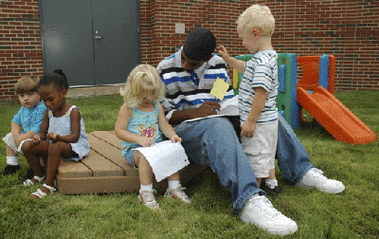teaching lab

The Children′s Program provides an opportunity for UA students and faculty to study and implement best practices for young children in group settings and to conduct research on the development of children and families.
The faculty in the Department of Human Development and Family Studies utilizes the center as a teaching laboratory for students enrolled in departmental courses. Regular involvement of college students in the laboratory setting allows students to learn about development and the education of young children through observation and interaction. Students who plan careers working with families or children have opportunities to translate theoretical knowledge into planning, implementing, and evaluating programs for children, and participating in distance learning and teaching. Many courses in the Department of Human Development and Family Studies, as well as other university courses, utilize observation booths to view children from infancy through preschool in developmentally appropriate environments. Knowledge gained in these naturalistic observations is essential for understanding child development and individual differences among children. In addition, teaching faculty serve as professional models for students by being involved in professional development, participating in professional organizations, attending local, regional and national meetings, and staying abreast of current literature in the area of Child Development and Early Childhood Education.
For The University of Alabama students, the focus of their involvement in a child development laboratory is on understanding children′s growth and development in all areas, developing appropriate experiences and environments that enhance children′s development, and participating in facilitating parental involvement and professional interactions.
The faculty in the Department of Human Development and Family Studies utilizes the center as a teaching laboratory for students enrolled in departmental courses. Regular involvement of college students in the laboratory setting allows students to learn about development and the education of young children through observation and interaction. Students who plan careers working with families or children have opportunities to translate theoretical knowledge into planning, implementing, and evaluating programs for children, and participating in distance learning and teaching. Many courses in the Department of Human Development and Family Studies, as well as other university courses, utilize observation booths to view children from infancy through preschool in developmentally appropriate environments. Knowledge gained in these naturalistic observations is essential for understanding child development and individual differences among children. In addition, teaching faculty serve as professional models for students by being involved in professional development, participating in professional organizations, attending local, regional and national meetings, and staying abreast of current literature in the area of Child Development and Early Childhood Education.
For The University of Alabama students, the focus of their involvement in a child development laboratory is on understanding children′s growth and development in all areas, developing appropriate experiences and environments that enhance children′s development, and participating in facilitating parental involvement and professional interactions.
